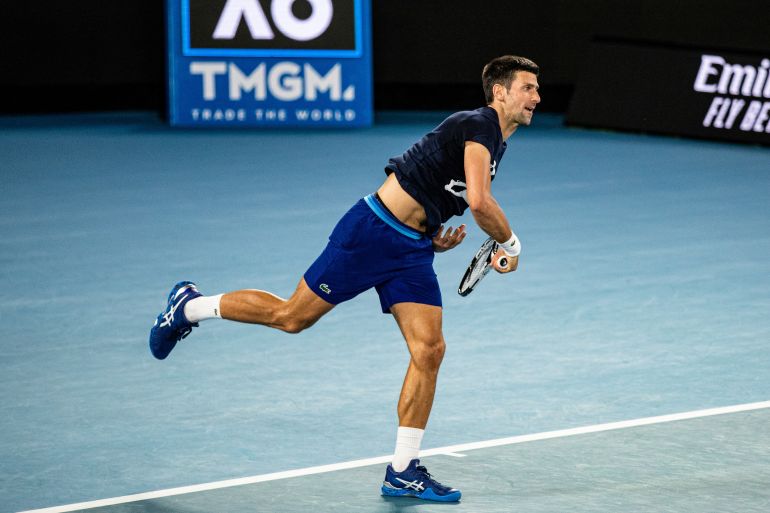Novak Djokovic saga: What happens next?
Tennis world number one’s participation in the Grand Slam in doubt as the government attempts to revoke his visa.

Novak Djokovic was reportedly back in immigration detention on Saturday after his legal challenge to avoid being deported from Australia for being unvaccinated for COVID-19 was moved to a higher court.
A Federal Court hearing was scheduled for Sunday, a day before the men’s number one-ranked tennis player and nine-time Australian Open champion was to begin his title defence at the first Grand Slam tennis tournament of the year.
Keep reading
list of 4 itemsDjokovic returns to detention as he fights Australia deportation
Australia delays Djokovic’s deportation after visa cancellation
Djokovic faces deportation after Australia visa cancelled again
Djokovic was again in limbo a week after he won a legal battle allowing him to stay in the country.
Here is a look at the controversial case and what could happen next:
Why deportation?
Many Australians – who have suffered prolonged lockdowns and border restrictions – say Djokovic gamed the system to dodge vaccine entry requirements.
But the government was humiliated when a judge reinstated Djokovic’s visa and allowed him to remain in the country.
This time, the government invoked exceptional – and difficult to challenge – executive powers to declare him a threat to public health and safety.
“Although I … accept that Mr Djokovic poses a negligible individual risk of transmitting COVID-19 to other persons, I nonetheless consider that his presence may be a risk to the health of the Australian community,” Immigration Minister Alex Hawke said in a letter to Djokovic and his legal team.
Who will rule?
Three judges at the Federal Court of Australia will hear Djokovic’s challenge.
“This matter will be heard by a full court of the Federal Court of Australia comprised of Chief Justice James Allsop, Justice Anthony Besanko and Justice David O’Callaghan,” it said.
A decision made by the full court will be final and parties will not be able to appeal the verdict.
What is Djokovic saying?
The tennis ace contracted COVID-19 in mid-December and, according to his own account, failed to isolate despite knowing he was positive.
Public records show he attended a stamp unveiling, youth tennis event, and granted a media interview at about the time he got tested and his infection was confirmed.
Djokovic’s lawyers said on Friday they would argue deportation would only further fan anti-vaccine sentiment.
What are other players saying?
The controversy has overshadowed the traditional build-up to the Grand Slam event, and players were fed up with the saga.
“Honestly I’m little bit tired of the situation because I just believe that it’s important to talk about our sport, about tennis,” Spaniard Rafael Nadal, who is tied on 20 major titles with Djokovic, told reporters at Melbourne Park, where the event will be played.
German Alexander Zverev, the world number three, said Djokovic had been treated unfairly and that the Serb might have been used as a political pawn by Australian authorities, something Canberra has denied.
“This is obviously not a nice thing for everyone, for him especially. But don’t question his legacy because of this,” Zverev said.
“I mean, he had a visa, right? I don’t think he would have travelled here just by luck without him thinking he would be able to play, with him having the right authorisation to be in the country. If you would have the visa, you would think you would be playing.”
Supporters rally
Protesters gathered near the venue for the Australian Open in response to the treatment of the Serbian tennis star. Opponents of vaccination mandates as well as supporters of Djokovic mixed at the rally.
“He’s being treated like a criminal, like he’s done something bad,” said Neb Jovanovic. “He came in with a valid exemption and now they’re trying to pick all these other reasons, and for what? The only other reason is to earn political points.”
Jeanette Wight, a Djokovic supporter, said: “I am ashamed to be Australian.”